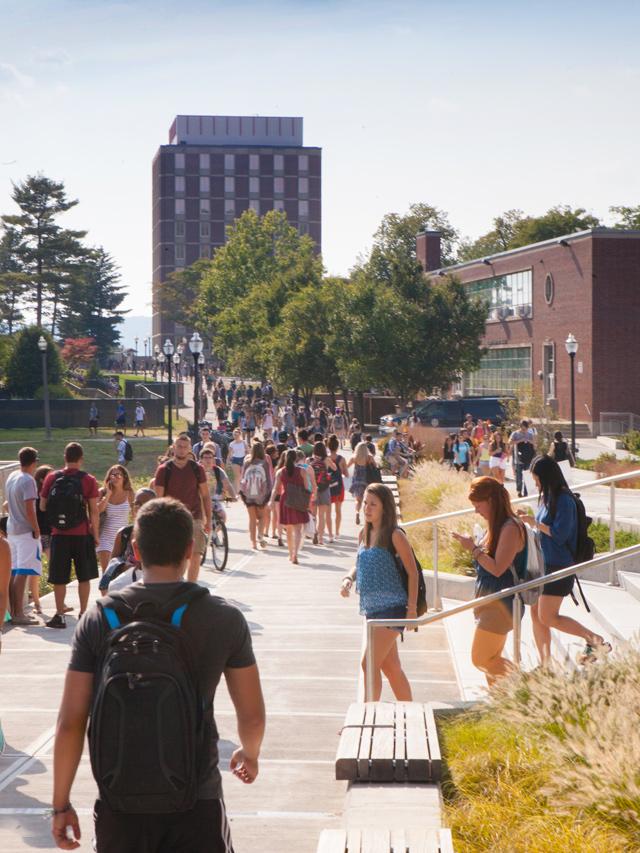OPINION: REFLECTING ON FOUR YEARS AS A LOW-INCOME STUDENT ADVOCATE AT UMASS

UMass Amherst. Photo: umass.edu
Editors’ Note: This column appeared previously in the UMass Daily Collegian. We congratulate Tim Scalona on his graduation from UMass and welcome him as a regular columnist at The Indy.

At the start of each new year at UMass Amherst, eager freshmen unpack their belongings from their family vehicles and head towards the dorms with hesitant curiosity. The melody of moving bins fills the air, as students wander among the buildings that will soon become their home. Present on the precipice between two worlds – past and future – these incoming freshmen are beginning a journey that will shape the direction of their lives.
When I entered UMass in 2016, my dorm in Pierpont Hall was the first home I had lived in for more than four years. Having spent my high school years in hotels and shelters, I felt a new-found sense of freedom at the ability to exist in my own space, free of homelessness. I long saw college as the solution to my impoverished reality. While my experience was valid, I quickly found that it did not reflect the community I had entered.
Memories of dinners where my six younger siblings and I ate canned goods or sandwiches were juxtaposed against the buffet style UMass dining experience I was then afforded. Peers spoke of international vacation destinations which I had only seen in history books, remarks that made me feel naked, my socioeconomic reality exposed in my silence. My classmates’ ability to spend money comfortably, without employment or economic worry, made me question the worth and validity of my experience. Forced to work at Staples the first month of my freshman year for the mere ability to buy textbooks, problems which I did not see or hear about in my immediate circles, I felt alone. In that first semester, I had hidden my experiences out of fear of judgement and ostracization, as I sought to redefine my story by removing the trauma of my past from all discussion.
However, seeking to stifle this identity only made it stronger. These experiences propelled my campus activism in pursuit of recognition and support for low-income students. I ran for senate in the Student Government Association in 2016 and joined the Center for Education Policy & Advocacy in 2017, during which I slowly began to divulge my personal experiences. On the Social Justice & Empowerment Committee, my fellow senators and I organized food drives and aimed to shape campus policy in ways that supported marginalized identities. It was through these initial organizations that I realized the systemic and institutional inequality that limits educational opportunity for impoverished, first-generation, and otherwise marginalized students. I then, around the same time, served as an Op/Ed columnist for the Massachusetts Daily Collegian. I wrote articles such as “Poor students left behind,” and “Subtle classism in a university environment,” to humanize my experience with poverty and its manifestation at UMass. I advocated for increased scholarships, financial aid and support structures for students whose experiences often exist on the margins of the faux stereotypical college reality.
Since 2016, dialogue around class has evolved on our campus, yet there is so much that still needs to be done. While I have dedicated my time as an undergraduate to supporting low-income students, the state of Massachusetts has systematically defunded public higher education, and tuition continues to rise and price out these communities. There exist some resources for low-income students around campus, but the scattered nature of such resources limits their accessibility. A centralized campus support center for first generation and low income (FGLI) students, as I wrote in an earlier article, “would offer students the resources and community to more easily flourish upon admission.”
This past December, my peers and I founded UMass FLIP, a support organization for first generation low income students. The first of its kind at UMass, this organization came into being after years of facing rejection from the Student Government Association due to minor technical details. This application process was itself a microcosm for the institutional barriers that marginalized students face on the road to success. Upon rejection, we had to appeal and plead the club’s case in front of the SGA. For a club founded on supporting poor and working-class students, the institutional knowledge and time commitment required for this process among others perpetuates educational inequality.
The University’s response to the coronavirus outbreak — though stronger than the support offered to disadvantaged students by many private universities — reflects these same disparities. The University has removed grant money from students and inadequately refunded them, while simultaneously laying off campus and agency workers. This loss of income disproportionately impacts financially unstable students. In the wake of a pandemic, this has provoked further housing and food-insecurity.
Through UMass, I gained a home and a community, and an inclusive space in which to share my experiences. Storytelling, in the face of injustice, has the power to provoke social change. While I graduate, I remain hopeful and proud of FGLI student advocates and allies, as we together build a UMass future where there is equitable access and support for all marginalized identities. As survivors, pioneers, and change makers, our fight goes on.
Timothy Scalona is a 2020 graduate of UMass Amherst, where he majored in political science and journalism.

Thanks Tim for writing this, your other articles, your work on campus and in our town as a member of Town Meeting. Your experiences are shared by many and speaking out makes us feel more at home and freer to talk.